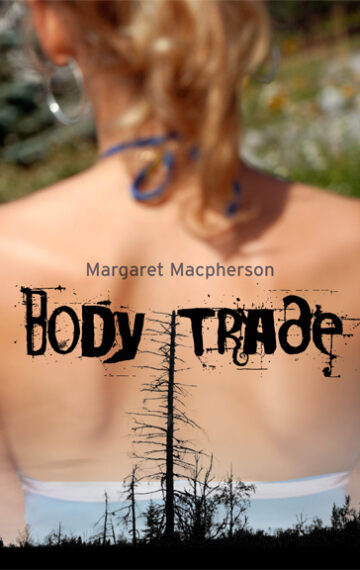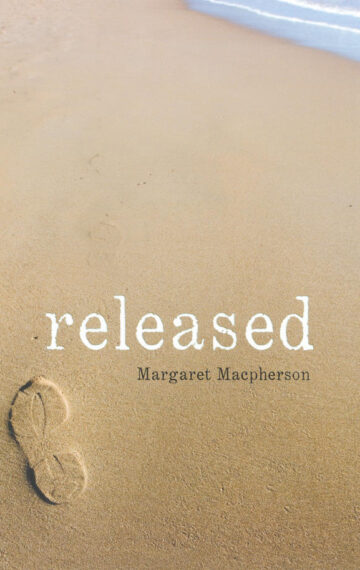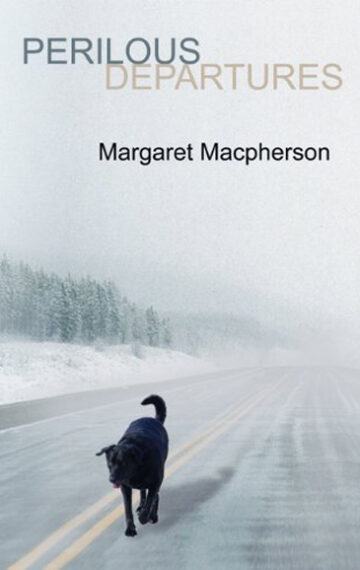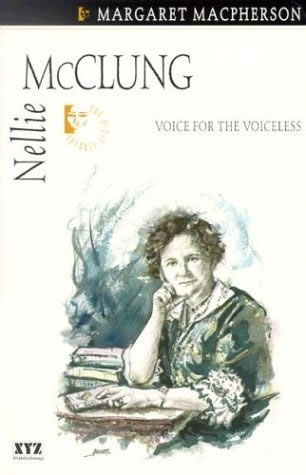Book Reviews
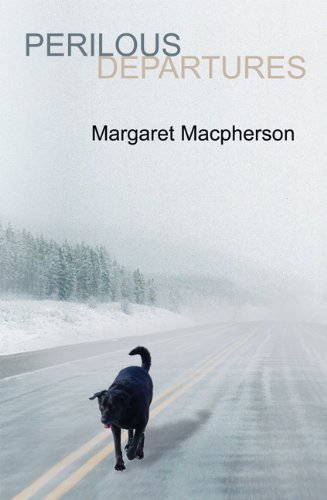
“Feeling just a little down? Feeling just a little blue? Try lunch with Edmonton writer Margaret Macpherson, the deliriously happy author of Perilous Departures, a collection of short stories that marks her debut as a writer of fiction. She’s so happy her book is out, she’s a tonic for whatever ails you. “But please don’t call the stories ‘sunny’,” the decidedly sunny Macpherson says over a lunch interview. “They’re not sunny.” She prefers to call them quietly optimistic, most of them anyway, and she’s right. They tell stories of survival, understanding and compassion. They’re accessible but multi-layered, sometimes subtly funny, and always honest and true. Many of the stories hinge on those moments of realization that many of us have which can suddenly change the whole course of a life. “Everything in life is a perilous departure,” says Macpherson, “because every life is a journey, even if you stay at home.” She’s published non-fiction before, most notably a recent and well-received biography entitled Nellie McClung: A Voice for the Voiceless. But chatting with Macpherson gives… Read more “”
Marc Horton
Edmonton Journal
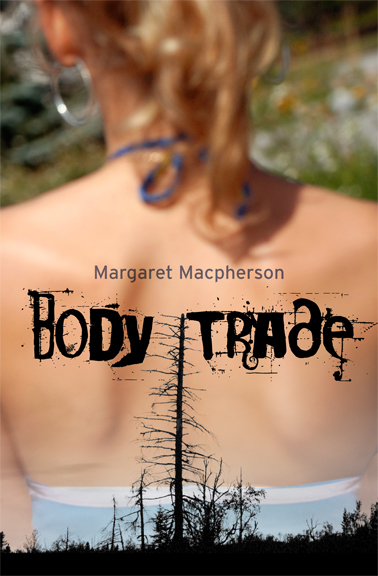
“If contemporary fiction is fighting for its life, its followers ought to be on the lookout for writers who are brave enough to swim against the current tide. And if a writer has genuine star quality, a sharper, deeper radiance than most, then he or she ought to be identified and celebrated without delay. Time may be of the essence. Margaret Macpherson, a relatively unknown Maritime-born Albertan, is such a writer, and Body Trade, her seventh book and second novel, is the proof. She writes with the psychological insight of Carol Shields, the gravitas of Margaret Atwood, the poetic reflexes of Earl Birney and the earthy eroticism of Leonard Cohen, but her voice remains uniquely her own. Body Trade, released by the Winnipeg literary house Signature Editions, is a haunting road novel best described as a poetic thriller grounded in the real world. Macpherson also has one distinct advantage: her natural territory is comparatively untouched as literary landscape. She is a non-aboriginal native of the Northwest Territories, known vaguely to Canadians as “the North” and… Read more “”
Lesley Hughes
Winnipeg Free Press
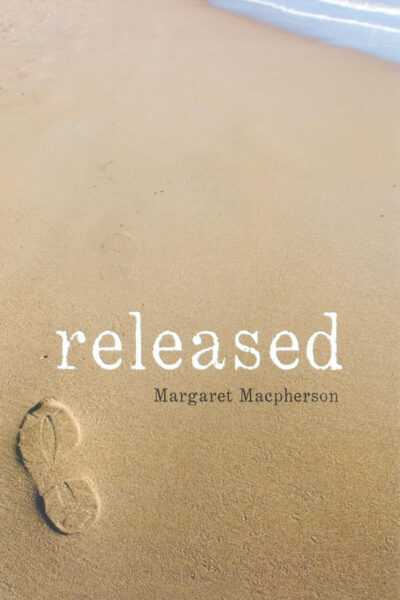
“Margaret writes ” We are all part of the great mystery”. For me, this novel draws us deep into the mysteries of the sacred places of the heart where we alone know who we are, where we’ve been, the place where extreme joy and massive hurt coexist to fuel our existence. Face to face with her inner place the main character finds both strength and weakness in who she is. She experiences what truth can do, the mysterious inner resource that resides in each of us for finding freedom through forgiveness. A marvelous read for a first novel. It engages you from page 1 and you can’t put it down. Anyone of any age can relate to this story. We have all taken the wrong paths from time to time, we have all suffered inner turmoil from unforgiveness but have we all found the inner path to unleashing forgiveness from our… Read more “”
Myrna A. Strain
Part of the Mystery

“…In Released, Margaret Macpherson creates no less than an epic story about Ruth, this made especially remarkable by the fact that Ruth only comes into her twenties within the time span of the novel. While Carroll’s novel [Body Contact] is more entertaining, Macpherson’s is sobering, as Ruth continually teeters between creative and destructive forces in her life. Hearkening back to the biblical namesake, Ruth is loyal, kind, and compassionate, and this may very well prove to be her undoing. A source of guilt for “Ruth the Tooth” is how she enters the world, born with teeth and causing pain to her mother during breast feeding. Her girlhood is marked by two significant factors; numerous painful dental procedures are mitigated by her saving grace, a strong connection and friendship with Jax. when the “summer of Jax” is complete, the reader wants her to reappear perhaps as inexplicably as she disappears, and Ruth will unconsciously search for her in future years. Naivete, guilt, and an ascetic bent draw Ruth to religious fanaticism in her adolescence, and to… Read more “”
Andrea Wasylow
Canadian Literature

“Two women in Yellowknife decide, on the spur of the moment, to drop everything, leave their jobs and head to Mexico. Tanya, the one with the Rambler, is a world-weary white woman working in the residential school; her travelling companion is Rosie, a 17-year-old native girl. Both carry the burden of a painful past. Off they go. It is 1973, the year after the northern crash of a mercy flight, with bush pilot Marten Hartwell having emerged as the sole survivor. This novel by Edmonton author Margaret Macpherson focuses on the journey of the two women, with the crash as a parallel story. By weaving together the two narratives, one factual, the other fictional, Macpherson delivers an intriguing tale with contemporary themes that ring true more than 40 years later. Hartwell was taking a nurse, a pregnant Inuk woman and a 14-yearold Inuk boy from Cambridge Bay to Yellowknife for medical help. When the plane crashed, the nurse and woman died on impact, and the boy lived for nearly three weeks by eating lichen. Hartwell… Read more “”
Cheryl Purdy
Edmonton Journal

“There is wisdom and subtle wit in Macpherson and the people she has created… These stories should be savored and reread. Perilous Departures is a… Read more “”
The Edmonton Journal

“Here’s the opening paragraph of Margaret Macpherson’s new novel, Body Trade: “The body is gone. People are milling around the church basement, visiting, relieved and happy that Lloyd can go directly into the ground. No hanging with the other stiffs in the ice house, waiting for the permafrost thaw. Nope, none of that for Lloyd. He’s somehow managed a summer accident. Cleaner. Faster. Probably the only clean thing Lloyd ever did.” Now that is a great opening for a novel. It’s swift, it’s clean and it establishes a strong narrative voice, that being Tanya, the 20-something tough girl who many at the funeral suspect had something to do with Lloyd’s death. Yes, she was having a fairly clumsy affair with Lloyd and, yes, she was working the bar the night he headed off drunk in his truck, but, no, she didn’t kill him. That doesn’t stop Tanya from deciding that maybe a little time away from Yellowknife and the Northwest Territories might just do her and Lloyd’s grieving widow a world of good. Meanwhile, we… Read more “”
Bill Robertson
The Star Pheonix

“Making Peace Author says book is about forgiveness When talking about her first novel, Released, and its protagonist, Ruth Callis, author Margaret Macpherson makes one thing clear: when she creates fiction; the characters come from her imagination. “The joy of fiction is using the writer’s imagination. This is my character’s life. Not my life. I created Ruth, and she tells her story,” she says. “I never felt like I was carrying around the weight of the world, telling Ruth’s story.” “I get up ad make sandwiches for lunch; then I enter her world. I engage and disengage. I have to.” Even though Macpherson goes beyond writing what she knows, she enjoys writing what she knows, she enjoys writing about where she’s been. Treks through Bermuda, Central America, Mexico, Europe, and Australia all left a mark on Released. “The book is all over the map: the East Coast, the Noth, Sudbury, Australia. And I really enjoyed writing about Yellowknife. Finding settings was the easy part.” The award-winning author says that love, betrayal, and redemption are… Read more “”
Linda Alberta
Prairie Books Now

“Two young women decide to blow their small, northern Canadian town and head south: the United States, Mexico and finally, Belize. The year is 1972. A carefree adventure becomes deadly serious for Tanya (experienced, pragmatic, overly confident) and Rosie (younger, naive, overly sensitive) in Margaret Macpherson’s new novel, Body Trade (Signature Editions). Impossible decisions must be made. “I’ve always had the title in my head,” Macpherson says. “I wanted to talk about the flesh trade. The idea of physical, human flesh. “Tanya’s a body girl,” she adds. “Tanya needs to be in charge, in control. She was a fun character to write. I loved her energy, her fuck-you attitude. “But I like Rosie, too. She’s so pure. Sex is a very tender thing to her.” As the two head further south, the novel becomes increasingly dark. “I like to call it Thelma and Louise meets Apocalypse Now,” Macpherson says. “They are in the Heart of Darkness. “It was a tough book to write, but I had to write… Read more “”
Quentin Mills-Fenn
Uptown

“I haven’t read a lot of road trip books (only Volkswagen Blues and On The Road come immediately to mind), but I love the idea of them. Body Trade has additional appeal to me as the road trip sets out from Yellowknife. It eventually winds up in Belize, but through flashbacks and a side story based on a real news event of the early 70s, the north maintains a strong… Read more “”
John Mutford
The Book Mine Set

“Good versus evil, coming of age, first love—all articulately presented in a gripping narrative–what more could you want in a novel? Edmonton’s Margaret Macpherson has published non-fiction (Nellie McClung: Voice for the Voiceless) and short stories (Perilous Departures), and her story-telling skills are now impressively showcased in Released, her first novel published by Winnipeg’s own Signature Editions. It’s the story of Ruth Callis, the youngest of five children who, remarkably enough, grow up in a happy home. Macpherson splits her narrative into two alternating accounts, one giving the trials and tribulations of Ruth’s growing-up years, and the other dealing with her love affair, at age 20, with Ian Bowen, a somewhat mysterious fellow 16 years her senior. At the most critical point of the novel, the two accounts converge. The Callis family lives in a Northwest Territories town, where the father works for a gold-mining company. Though the mother doesn’t exactly like it up North, she hasn’t let it embitter her, and the kids seem to get along well with both parents. Much is made… Read more “”
The Winnipeg Free Press

“Body Trade begins with two exquisitely drawn characters. Tanya Price is the quintessential bad girl who runs away, on many levels, from Hope (BC). At 22 years old, her outlook is informed by “temporary relationships” as daughter, girlfriend and friend—she understands completely how the female body is commodified. Rosie Gladue is her opposite, a naive 17-year-old virgin grounded spiritually by the teachings of northern Canada’s Dogrib people. Tanya and Rosie meet in 1972 at a Yellowknife residential school, where Tanya is the daytime secretary and Rosie is a cleaner. Rosie’s grandmother and mother are now dead and her brother is in jail. The young women are drawn together by their desire to escape Yellowknife. For Rosie, their connection is also spiritual, something she accepts without question. Tanya, however, never fully honours or understands that bond. The opening chapters set up an angel/whore dichotomy, and despite Macpherson’s beautifully poetic prose, some readers may find this approach blatant, especially later in the novel where the narrative offers repeated examples of virgin sacrifice. But one of Body Trade’s… Read more “”
Anne Sorbie
Alberta Views
Copyright
(c) Margaret Macpherson 2021, with site design and custom graphics by Always Brave Creative
